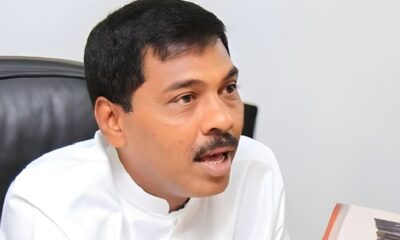FEATURES
UK counts down to King Charles’ historic Coronation
Published
2 years agoon
By
editor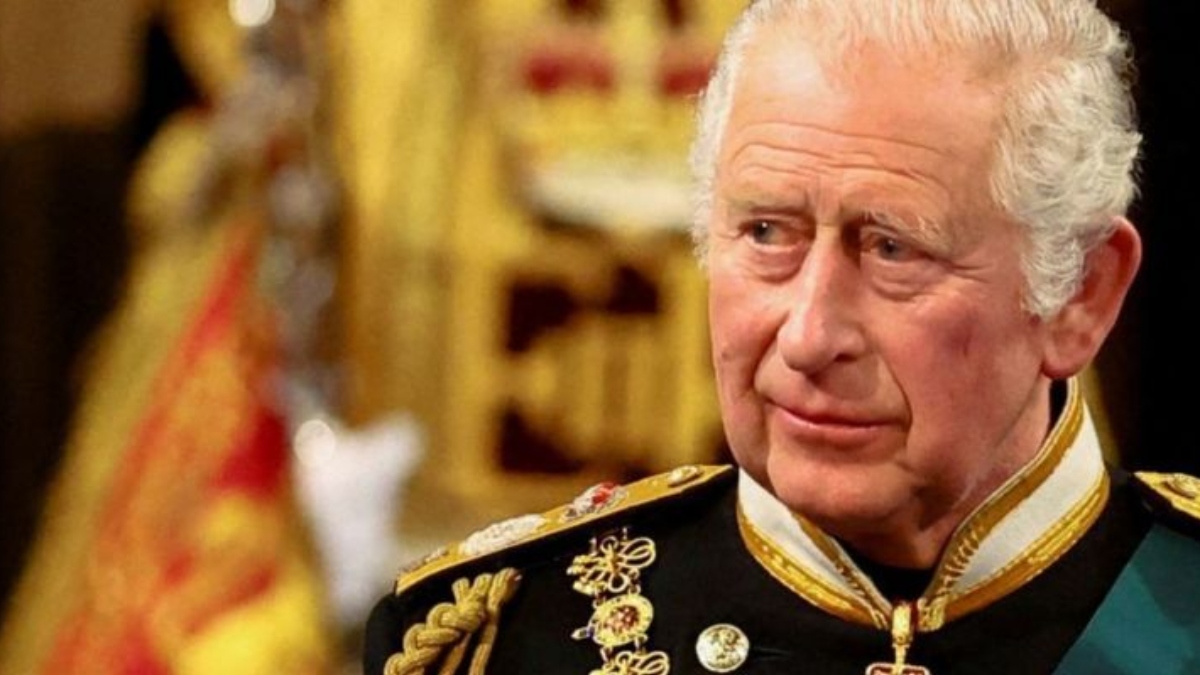
The first coronation in 70 years is to take place on Saturday morning, with King Charles III and the Queen Consort preparing for their historic carriage ride to Westminster Abbey.
Despite forecasts of rain, crowds have already begun to gather on the procession route.
There will be a huge security operation in central London, with 100 heads of state set to attend.
Protests have been promised by those opposed to the monarchy.
The Coronation service, which will last almost two hours, will be seen first-hand by 2,300 guests, including Prince Harry, the Duke of Sussex, who arrived from the United States on Friday on a commercial flight.
It will be the first time since the release of Prince Harry’s memoir that he will have been seen in public with his brother, Prince William, the Prince of Wales.
It is thought Prince Harry may fly back to the US a matter of hours after the ceremony to rejoin his wife Meghan.
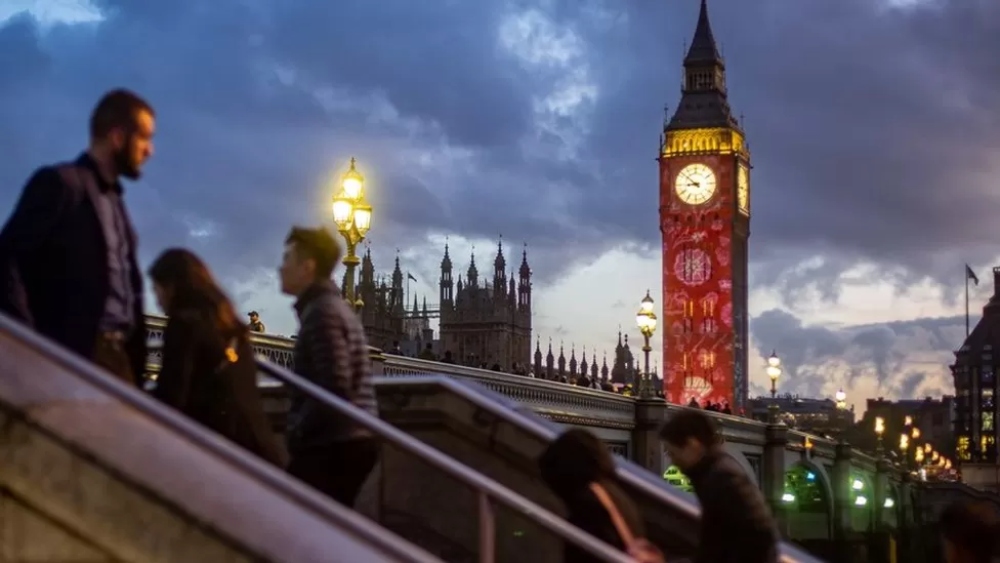
Image caption,London landmarks were lit up with projections to mark the Coronation
Charles became king of the United Kingdom and 14 other realms in September, when his mother Elizabeth died after 70 years on the throne. Months of intense planning have gone into the coronation celebrations – the 40th to take place at Westminster Abbey since 1066.
On the eve of the Coronation, the King looked relaxed as he went on a walkabout on the Mall, flanked by the Prince and Princess of Wales and a heavy security detail.
Barbara Crowther, 69, and her friend Pauline, joined the crowds holding a “Coronation Street” banner.
“We weren’t going to camp, but there are so many people here, we thought that if we don’t camp out, we won’t get anywhere near the front,” said Ms Crowther.
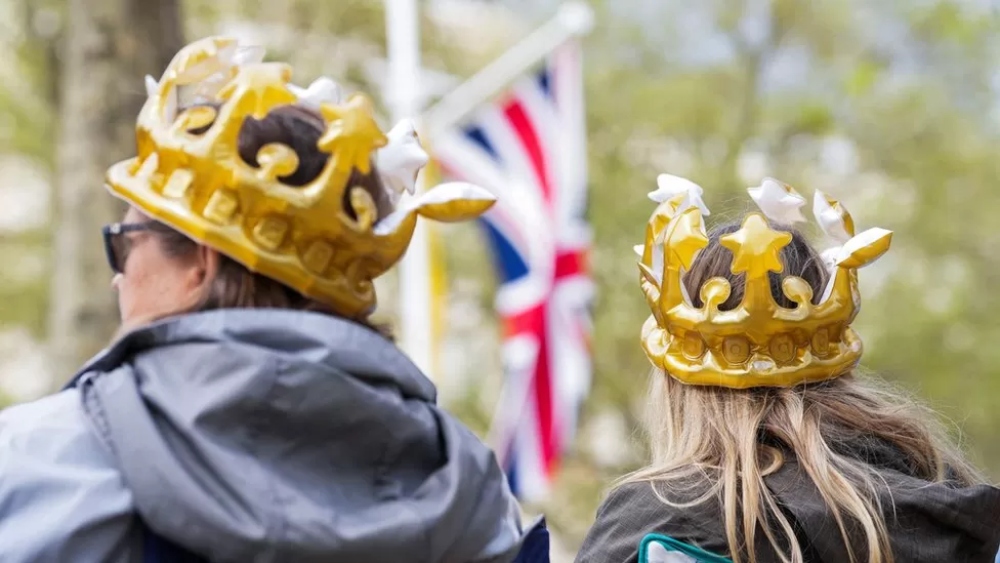
Image caption,Royal fans had been gathering on the Mall the day before the Coronation
Katie Gordon, from Wiltshire, was painting faces with her two daughters on Friday. She thinks the new King and Queen are “going to be great”.
“We’re camping out tonight ready for the Coronation, and they’re painting everyone’s faces as they walk by,” Ms Gordon said.
“We’re doing it for free, it’s just something we’re doing. We bought the facepaints for ourselves and thought, why not do it for other people too?
As the sun set on Friday, hundreds of tents had appeared along the Coronation route, with those gathered hoping to witness the historic event.
The Archbishop of Canterbury, Justin Welby, will preside over the service, with guests ranging from US First Lady Jill Biden to President Macron of France and entertainers Ant and Dec.
Olena Zelenska, wife of the Ukrainian president Volodymyr Zelensky, met Catherine, Princess of Wales at a pre-Coronation reception at Buckingham Palace on Friday.
Charles was photographed sharing warm words with the First Lady of Ukraine, and greeting Mary, Crown Princess of Denmark, with a handshake and a kiss on the cheek.
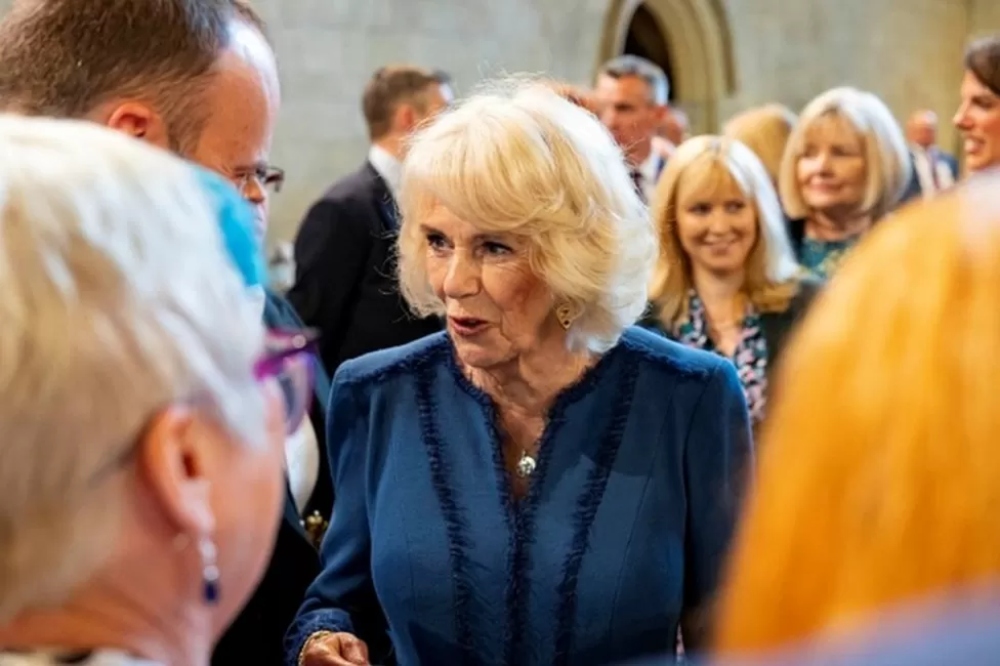
Image caption,The Queen Consort, at an event in Parliament this week, will be crowned alongside the King
There has been controversy over whether people at home were being asked to pledge their allegiance to the King.
The Church of England has made clear this is entirely optional and people might instead have a “private moment of reflection”.
The keynote message of the Coronation from King Charles is in his first prayer when he reaches the Abbey reads: “I come not to be served, but to serve.”
The high point of the ceremony will come when the St Edward’s Crown is placed on the King’s head, a moment that will be marked by the Abbey bells being rung and a gun salute in nearby Horse Guards Parade.
Camilla will be crowned alongside Charles – and after the couple’s long and often complicated relationship, she will now be officially described as “Queen Camilla”.
The ceremony will emphasise diversity and inclusion, with more multi-faith elements than any previous coronation, with contributions from Jewish, Muslim, Buddhist and Sikh representatives.
A Bible lesson will be read by Prime Minister Rishi Sunak, who is Hindu, and music will be sung in Welsh and Scottish and Irish Gaelic.
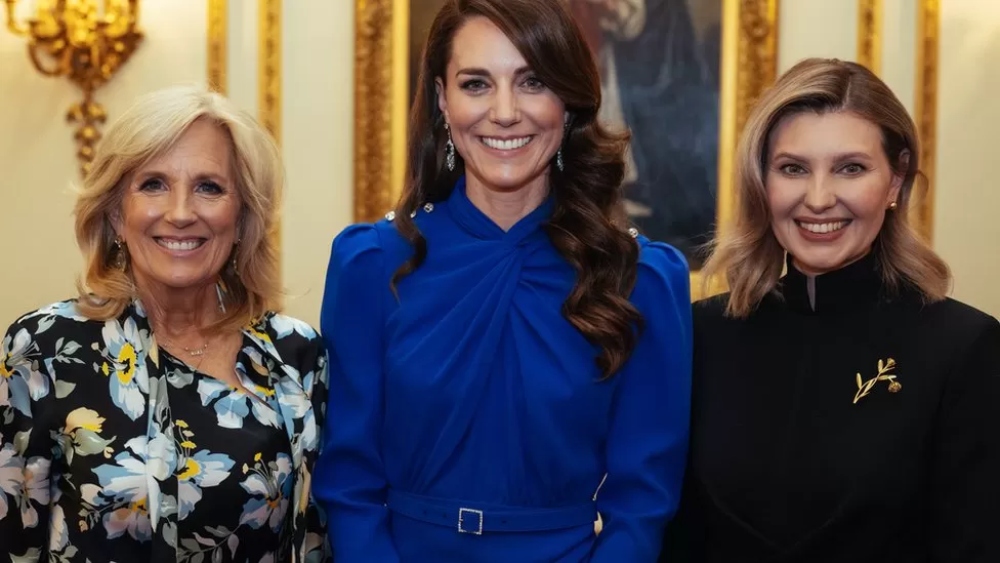
Image caption,At a pre-Coronation reception, US First Lady, Jill Biden, the Princess of Wales and Olena Zelenska, First Lady of Ukraine
There will be women bishops taking part in the service for the first time in a coronation service that goes back almost a thousand years.
After the service, at around 13:00 BST, King Charles and Queen Camilla will travel in the Gold State Coach back to Buckingham Palace, in a spectacular mile-long (1.6km) procession, with 4,000 soldiers and 19 military bands.
Meticulous rehearsals for the procession were carried out by marching around a replica route with landmarks such as the Cenotaph marked out with traffic cones.
When they reach the Palace, it remains uncertain who will be seen with the King and Queen for the traditional balcony appearance.
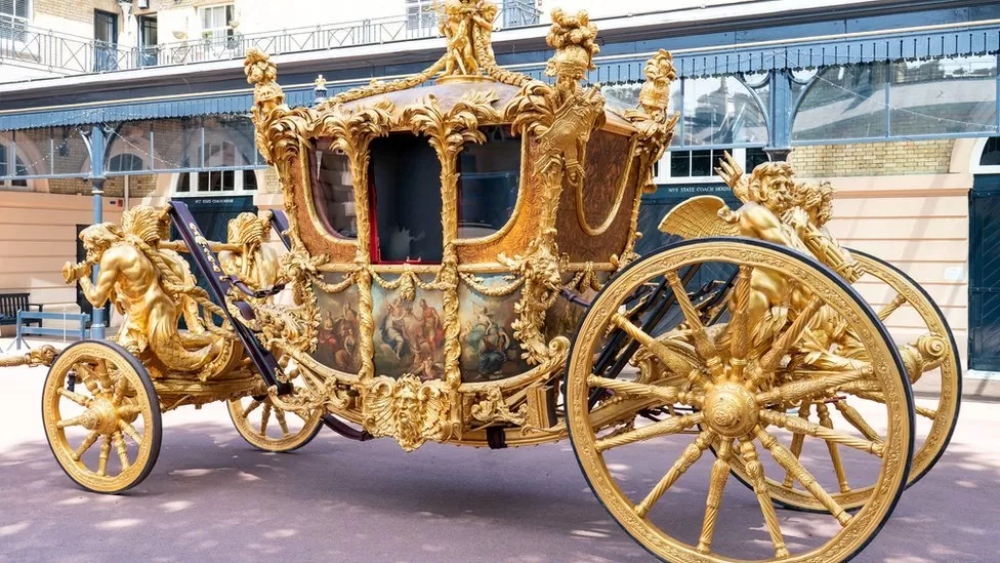
Image caption,The traditional Gold State Coach will be used on the way back to Buckingham Palace
There are plans for a flypast when the senior royals are on the Palace balcony, but there will be concerns about the weather, with a forecast for cloud and showers.
The run-up to the Coronation has also seen a number of vocal protests from anti-monarchy groups – and the Republic campaign group has announced its intention to hold a protest on the route of the procession.
There will be a massive security operation, with the Metropolitan Police putting 11,500 officers on duty in what it says will be its biggest ever single-day deployment.
Anti-monarchy groups have defended their right to protest, but the police have warned that “tolerance for any disruption, whether through protest or otherwise, will be low”.
The guest list has also been disputed, with criticism of the presence of Chinese vice-president Han Zheng, accused of presiding over a crackdown on civil liberties in Hong Kong.
But this will be a ceremony played out before a huge global audience, with TV crews from all over the world arriving in London.
They will see pageantry, religious symbolism and ancient traditions, with King Charles III crowned in a 700-year-old Coronation chair, in a ceremony that most people will never have seen before in their lives.
BBC NEWS
You may like
-
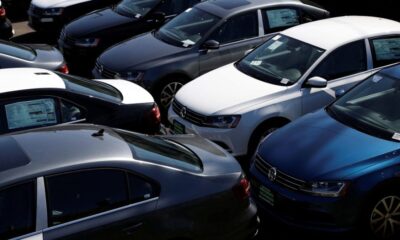

2nd phase of bidding for luxury vehicles from Prez Secretariat commences
-


IPL suspended for a week over safety concerns
-
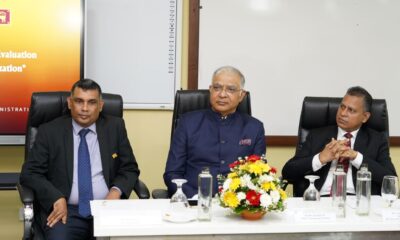

First capacity-building program under NCGG – SLIDA MoU concludes successfully
-


Bell 212 helicopter crash : Death toll rises to 06 (Update)
-
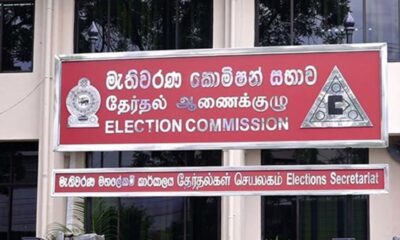

LG Polls: EC sets deadline to submit campaign finance reports
-


Special train schedule for Vesak festival & long weekend
FEATURES
Jewels linked to Buddha remains go to auction, sparking ethical debate
Published
4 days agoon
May 5, 2025By
editor
The jewels comprise nearly 1,800 pearls, rubies, sapphires, and patterned gold sheets
On Wednesday, a cache of dazzling jewels linked to the Buddha’s mortal remains, which have been hailed as one of the most astonishing archaeological finds of the modern era, will go under the hammer at Sotheby’s in Hong Kong.
For over a century these relics, unearthed from a dusty mound in northern India in 1898, have sat largely unseen, cradled by a private British collection.
Now, as the gems prepare to leave the custody of their keepers, they are stirring not just collectors’ appetites but also some unease.
They come from a glittering hoard of nearly 1,800 pearls, rubies, topaz, sapphires, and patterned gold sheets, first glimpsed deep inside a brick chamber in present-day Uttar Pradesh in India, near the Buddha’s birthplace.
Their discovery – alongside bone fragments identified by an inscribed urn as belonging to the Buddha himself – reverberated through the world of archaeology. Nicolas Chow, chairman of Sotheby’s Asia and worldwide head of Asian Art, believes this is “among the most extraordinary archaeological discoveries of all time”.
Yet as these relics now face the glare of the auction room, experts tell the BBC that a question hangs heavy: can the sale of treasures so intimately woven into India’s sacred past be considered ethical?

William Claxton Peppé, an English estate manager, excavated the stupa and found the jewels
In 1898, William Claxton Peppé, an English estate manager, excavated a stupa at Piprahwa, just south of Lumbini, where the Buddha is believed to have been born. He uncovered relics inscribed and consecrated nearly 2,000 years ago.
Historians agree these relics, intact until then, are the heritage of both the Buddha’s Sakya clan descendants and Buddhists worldwide. The bone relics have since been distributed to countries such as Thailand, Sri Lanka and Myanmar, where they continue to be venerated.
“Are the relics of the Buddha a commodity that can be treated like a work of art to be sold on the market?” wonders Naman Ahuja, a Delhi-based art historian. “And since they aren’t, how is the seller ethically authorised to auction them?
“Since the seller is termed the ‘custodian’, I would like to ask – custodian on whose behalf? Does custodianship permit them now to sell these relics?”
Chris Peppé, great-grandson of William, told the BBC the family looked into donating the relics, but all options presented problems and an auction seemed the “fairest and most transparent way to transfer these relics to Buddhists”.
Julian King, Sotheby’s international specialist and head of sale, Himalayan Art, New York told the BBC the auction house had made a thorough review of the jewels.
“As is the case with any important items and collectibles that are offered for sale at Sotheby’s, we conducted requisite due diligence, including in relation to authenticity and provenance, legality and other considerations in line with our policies and industry standards for artworks and treasures,” King said.
Ashley Thompson, of Soas University of London, and curator Conan Cheong, both experts in Southeast Asian art, have more questions. In a joint statement they told the BBC: “Other ethical questions raised by the sale are: should human remains be traded? And who gets to decide what are human remains or not? For many Buddhist practitioners around the world, the gems on sale are part and parcel of the bones and ash.”
The sale of the relics has also sparked concern among Buddhist leaders.
“The Buddha teaches us not to take other people’s possessions without permission,” Amal Abeyawardene of London-based British MahaBodhi Society, told the BBC. “Historical records indicate that the Sakyamuni clan were granted custody of these relics, as the Buddha emanated from their community. Their wish was for these relics to be preserved alongside adornments, such as these gems, so that they may be venerated in perpetuity by the Buddha’s followers.”

The jewels were unearthed from this stupa in Piprahwa, northern India in 1898
Chris Peppé has written that the jewels passed from his great-uncle to his cousin, and in 2013 came to him and two other cousins. That’s when he began researching their discovery by his great-grandfather.
The Los Angeles-based television director and film editor wrote he had found 1898 newspaper reports – from Reuters to the New York Tribune – announcing the find of Buddha’s remains.
“The colonisation of India by the British had been a source of some cultural shame for me [and continues to be] but, amidst the treasure hunters who hauled their finds back to England, there had also been people focused on the pursuit of knowledge,” Chris Peppé writes.
He noted his research revealed a lot about his ancestors who he had dismissed as “prejudiced Victorians from a bygone era”.
“I learned that Willie Peppé’s first wife chose to travel around India for her honeymoon and loved the country and its culture. Sadly, she died from an unspecified illness. I learned that my grandmother was outraged at the land laws that applied to Indian women.
“And I learned that the excavation of the stupa was an attempt by Willie Peppé to provide work for his tenant farmers who had fallen victim to the famine of 1897.”

The jewels are considered among the most extraordinary archaeological finds of all time
He writes his great-grandfather’s “technical diagrams of ramps and pulleys suggest that he was also a trained engineer who couldn’t resist a project”.
William Peppé handed the gems, relics and reliquaries to the colonial Indian government: the bone relics went to the Buddhist King of Siam (Rama V). Five relic urns, a stone chest and most other relics were sent to the Indian Museum in Kolkata – then the Imperial Museum of Calcutta.
Only a small “portion of duplicates”, which he was allowed to keep, remained in the Peppé family, he notes. (Sotheby’s notes say Peppé was allowed to keep approximately one-fifth of the discovery.)
Sources told the BBC the auction house considers the “duplicates” to be original items considered surplus to those donated, which the “Indian government permitted Peppé to retain”.
Over the past six years years, the gems have featured in major exhibitions, including one at The Met in 2023. The Peppé family has also launched a website to “share our research”.

Four containers made of steatite (a type of stone) and one made of rock crystal were found inside a sandstone box at the Piprahwa stupa
Some scholars argue Buddha relics should never be treated as market commodities.
“The Sotheby’s auction transforms these highly sacred materials into saleable objects, in continuation of acts of colonial violence which extracted them from a stupa and called them ‘gems’ and ‘objects of interest to Europeans’, creating a false division with the ash and bone fragments they were consecrated with,” say Thompson and Cheong.
Chris Peppé told the BBC that in all the monasteries he had visited “no Buddhists regard these as corporeal relics”.
“A few Buddhist academics at western universities have recently offered a convoluted, fact-defying logic whereby they may be regarded as such. It’s an academic construct that is not shared by Buddhists in general who are familiar with the details of the find,” he said.
Peppé said the family “looked into donation [of the relics] to temples and museums and they all presented different problems on closer scrutiny”.
“An auction seems the fairest and most transparent way to transfer these relics to Buddhists and we are confident that Sotheby’s will achieve that.”
Some also point to The Koh-i-Noor, seized by the British East India Company and now part of the Crown Jewels, with many Indians viewing it as stolen. Should the Buddha’s jewels be next?
“Repatriation, I believe, is seldom necessary,” says Ahuja. “Such rare and sacred relics that are unique and which define a land’s cultural history, however, deserve the government’s exceptional attention.”
– Soutik Biswas
(India correspondent – BBC News)
FEATURES
What has Sri Lanka gained from EU GSP “Plus” since 2007?
Published
6 days agoon
May 3, 2025By
editor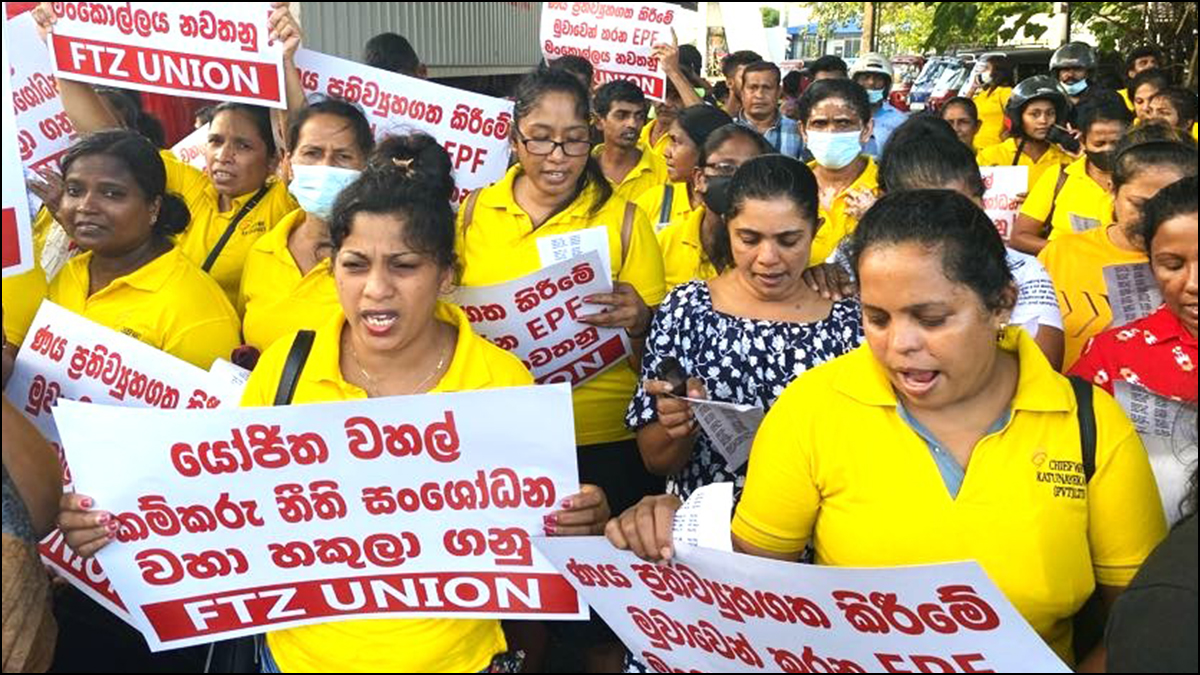
Let me say this straight and clear. “Sri Lanka has not gained anything on EU conditions laid down to qualify Sri Lanka for EU GSP+ post-Tsunami special offer”. What does the EU offer us and what have we to comply with?
EU offers “zero duty” exports for over 700 listed Sri Lankan products including apparels, rubber and fish products, bicycles, toys, tea and spices, electrical parts and few others to the EU market. That means, though our present basket is limited, over 700 Sri Lankan products can be sold in the EU market at subsidised “zero duty” prices, hopefully gaining increasing volumes. But who gains on increased value on sales?
With heavy corruption across geographical borders including money laundering, this is one major question that is not being asked and answered in detail by the government nor by the manufacturers. What is manufactured here for exports are exclusive “orders” from “Brands” received by product manufacturing companies through “Suppliers” on quoted and agreed prices. They not only have agreed prices, but agreed deadlines in handing over the finished product with pre-defined quality standards. What it means is, a “supplier” brings an order from a global “brand” and a manufacturing company with BOI-SL approval located in Sri Lanka that accepts the order is paid for its manufacture. That product is sold in a consumer market including the EU by its “brand” at a price fixed by the “brand”.
Once the supplier takes over the product from the Sri Lankan manufacturer, we don’t have anything to do with its sales in any consumer market. In simpler language, we don’t have anything to do with the product, once it leaves Colombo port. This too is important. The “zero duty” export concession is provided to listed Sri Lankan products and not to Sri Lanka. It is therefore enjoyed by the “brand” that owns the “product label”, perhaps with a share to the “supplier” on pre-agreed terms. May be, the SL manufacturer too gets “something” through the “supplier”, but that is wholly unofficial and out of public gaze. But for sure, that does not reach Sri Lanka and is not Sri Lanka’s gain.
What are we as a country expected to comply with, to continue with this GSP+ that brings us no economic benefits? First qualification is, Sri Lanka has to remain below the “Upper Middle Income” (UMI) category of countries. Thereafter, Sri Lankan government has to ensure implementation of 27 International Conventions that cover human rights, labour standards and rights, environmental protection and good governance. This does not mean ratification of “conventions” that SL has done in most instances, but also effectively implementing them with new laws and legal amendments where necessary.
Beyond economics, this requirement in effectively and sustainably democratising the Sri Lankan society is definitely worth complying with. Yet, all through past years when EU GSP+ was effective and in operation, neither SL governments nor the EU were serious about any of the 27 international conventions the EU imposed on SL to implement. The EU has sent 03 or 04 GSP+ Review Missions to Sri Lanka during these 17 or 18 years, that met numerous agencies, groups and individuals including the Head of State, relevant ministers, Opposition Leader and politicians, private sector trade unions and funded civil society activists in Colombo. All such review missions left Sri Lanka with a nod for an extension of GSP+ though with reservations at times on delays in implementation, except in 2010 when the EU was under pressure from Tamil Diaspora groups after the civil war was declared over in 2009 May.
This suspension was effective till 2017 for 07 whole years. The new government elected in January 2015 thereafter re-applied for GSP+ in 2016 June. What is important to note is that, during the 07 years SL was denied the “comfort” of “zero tariff” exports to Europe, Sri Lanka’s exports did not drop. According to the “Brief on International Trade” published by the Department of Commerce in October 2021, during the 02 years after the withdrawal of GSP+ the value of Sri Lankan products sold in European markets totalled 01.8 billion Euro. A little more than what it was in 2016, the year before the GSP+ suspension. Surprisingly, the value of merchandise from Sri Lanka sold in European markets during the next few years increased to around 02 billion Euros, before SL regained GSP+ in 2017. It only means, with or without EU GSP+, Sri Lankan products would be there in the EU market.
What needs to be stressed is, 10 plus years of EU GSP+ in full operation (that excludes the suspension), private sector labour that manufacture all Sri Lankan products in the EU markets, have not gained even the basic right to association and therefore not even collective bargaining, except in 01 factory out of over 1,600 factories. Repeal of the notorious repressive law, the PTA that was promised to be repealed way back in 2017 by the then government, is now said to take few more months if it does happen under the present regime and the EU Review Mission seems “okay” with it too. Environmental safety is under an axe with continued deforestation no matter who the government is. Breakdown in law, organised crime and mega corruption that involves the State hierarchy as well, would speak volumes about what “good governance” goes through despite EU monitoring of EU GSP+ with regular extensions.
End of the day, if the EU is not serious about having their conditions implemented, and if Sri Lankan governments can go on dragging their promises for democratisation over decades with no economic gains either, we are only wasting our tariff and tax incomes in billions doled out as annual incentives topping up free infrastructure provided to foreign direct investors, expecting them to provide us with much wanted forex. We need something more than a forensic audit to see how much we have lost as incentives given to export manufacture, a seriously corrupt sector most do not speak about.
That’s a wee bit about EU GSP+ and we Sri Lankans for now.
– Kusal Perera
2025 May 02
FEATURES
Apple says most US-bound iPhones no longer made in China
Published
1 week agoon
May 2, 2025By
editor
Apple says it is shifting production of most iPhones and other devices to be sold in the US away from China, which has been the focus of President Donald Trump’s tariffs.
The majority of the iPhones bound for the US market in the coming months will be made in India, while Vietnam will be a major production hub for items like iPads and Apple Watches, chief executive Tim Cook says.
It comes as the technology giant estimated that US import taxes could add about $900m (£677.5m) to its costs in the current quarter, despite Trump’s decision to spare key electronics from the new tariffs.
The Trump administration has repeatedly said it wants Apple to move production to America.
The estimate comes as firms around the world are scrambling to respond to the huge shifts in global trade triggered by Washington’s trade policies.
On a call with investors on Thursday to discuss the firm’s financial performance, the Apple boss seemed keen to draw attention to its investments in the US.
Mr Cook opened the discussion with a reminder of the company’s plans to invest $500bn across several US states over the next four years.
Made in India
He also said Apple is shifting its supply chain for US-bound products away from China, but it is India and Vietnam that are poised to be major beneficiaries of that move.
“We do expect the majority of iPhones sold in US will have India as their country of origin,” Mr Cook said.
Meanwhile, Vietnam will be the chief manufacturing hub “for almost all iPad, Mac, Apple Watch and AirPods product sold in the US.”
China will remain the country of origin for the vast majority of total products sold outside the US, he added.
Apple shares had plummeted after Trump announced his administration would levy “reciprocal tariffs” on products imported to the United States, with the aim of persuading companies to manufacture more in the US.
But his administration faced significant pressure to moderate its plans. Shortly after the tariffs went into effect, it announced that certain electronics, including phones and computers, would be exempted.
Uncertainty reigns
For now, trade turmoil has left Apple’s sales unscathed.
The company said revenues for the first three months of the year rose 5% from the same period last year, to $95.4bn.
Designed in US, made in China: Why Apple is stuck
Trump tells business chiefs he needs ‘little bit of time’ as US economy shrinks
Trump calls Bezos as Amazon says no plan to show tariff price rises
Amazon, another tech giant whose results were being closely watched for signs of tariff damage, likewise said sales were holding up, rising 8% year-on-year in its North America e-commerce business in the most recent quarter.
It forecast similar growth in the months ahead.
“Obviously no one of us knows exactly where tariffs will settle or when,” said Amazon boss Andy Jassy, while noting that the firm has emerged from periods of disruption – like the pandemic – stronger than before.
“We’re often able to weather challenging conditions better than others,” he said. “I’m optimistic this could happen again.”
New positioning
The shift of the iPhone supply chain to India was “impressive” according to Patrick Moorhead, chief executive of Moor Insights & Strategy.
“This is a marked change from what [Cook] said a few years back when he said that only China can build iPhones,” Mr Moorhead said.
“There is lots of progress that Apple must show here but it’s a pretty good start,” he said.
Amazon is also repositioning itself to increase resilience in the face of the tariffs.
The company said it working to make sure it had a diversity of sellers and Mr Jassy said he felt the firm was well-positioned for the months ahead, pointing to the firm’s scale and its role supplying everyday essentials.
For now, it said sales had not been hurt by the tariff turmoil. If anything, executives said the business may have benefited from some customers starting to stockpile.
Overall sales jumped 9% to $155.7bn in the first three months of 2025, compared with the same period last year, while profits surged more than 60% year-on-year to roughly $17bn.
Lily Jamali – North America Technology Correspondent
Natalie Sherman- Business reporter
(BBC News)

2nd phase of bidding for luxury vehicles from Prez Secretariat commences

IPL suspended for a week over safety concerns













